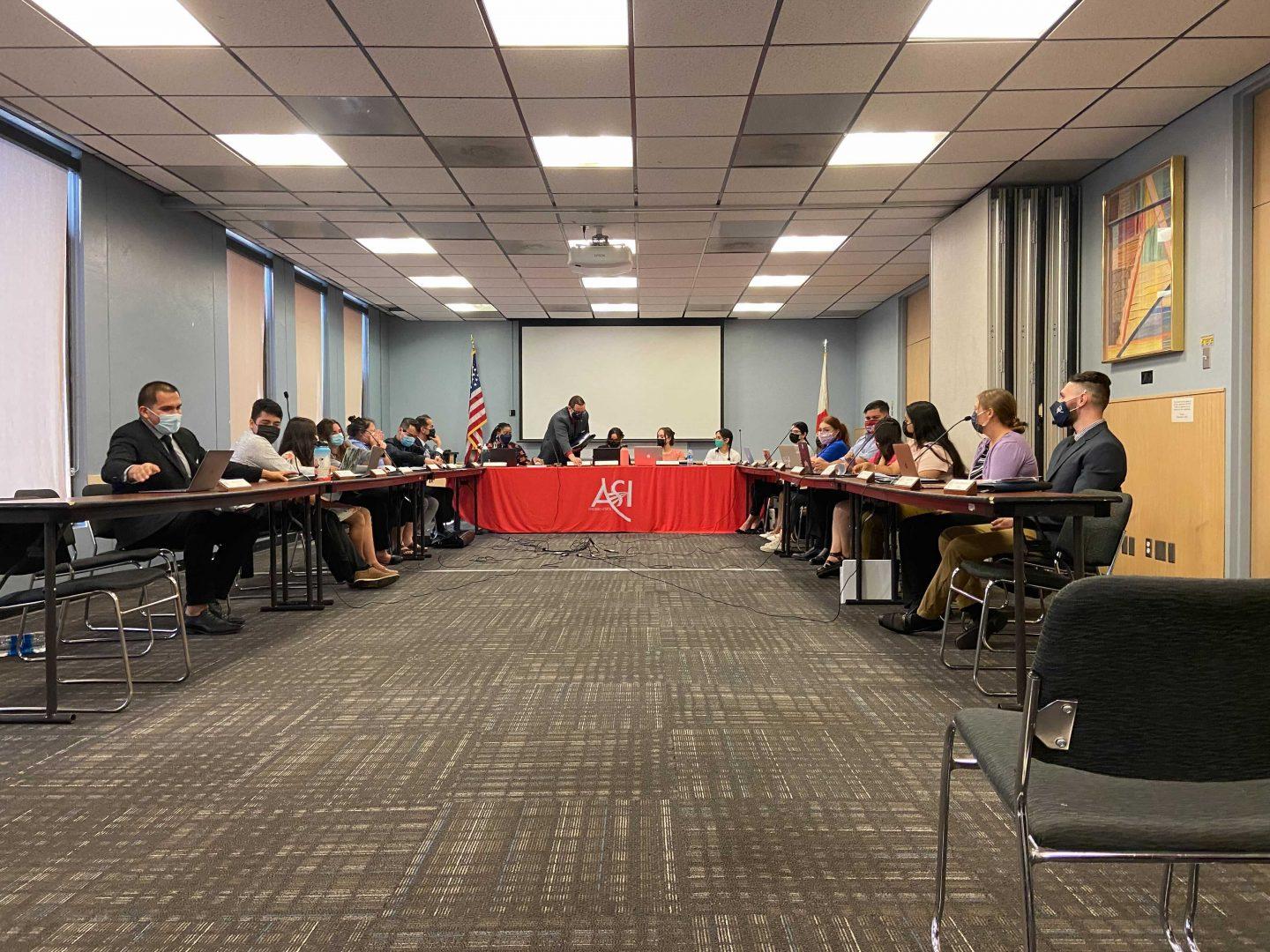Fresno State Associated Students Inc. (ASI) President D’Aungillique Jackson said 86% of students are vaccinated at a meeting where senators also elected a new executive vice president.
This percentage is higher than the number of vaccinated employees.
As of Sept. 22, about 68% (1,749 out of 2,568) of Fresno State employees have received at least one dose of the COVID-19 vaccine. These numbers do not take into account auxiliary employees.
At the meeting, senators discussed the student government’s plans to address the COVID-19 pandemic for this fall semester and the upcoming spring semester. The senate also elected Jose Medina III to the position of executive vice president.
ASI President D’Aungillique Jackson briefed the senators on the most recent statistics surrounding the student and employee vaccination efforts on campus as she was last informed by the administration.
Jackson said 65% of faculty have certified their vaccinations in the latest information she received.
“Approximately 86% of our students are either fully or partially vaccinated, and that equates to about 21,000 students, and roughly 10% of students have claimed some type of exemption,” Jackson said.
“And that comes out to about 2,200 students: 249 have claimed in medical while roughly 1,900 have claimed religious [exemptions].”
As of Sept. 22, Fresno State spokesperson Lisa Boyles Bell confirmed the numbers Jackson presented at the meeting. Additionally, 1.03% of students requested a medical exemption while 8.12% requested a religious exemption.
Out of all students currently enrolled at Fresno State, 4.86% will not be attending in-person classes.
Approximately 477 students enrolled in in-person classes have not completed the self certification forms.
Fresno State expects to administer approximately 4,000 weekly tests to its 1,300 employees and 2,700 students.
During the week of Sept. 6, the university conducted 1,300 tests.
Boyles Bell clarified in an email correspondence that, unlike students, university employee vaccinations are voluntary and self-certified. They also must provide their own proof of vaccination.
Contact Tracing Protocols
Jackson addressed the issue of transparency regarding COVID-19 protocols and discrepancies surrounding contact tracing of people who were potentially exposed to COVID-19.
Jackson acknowledged that university President Saúl Jiménez-Sandoval and herself initially believed that officials informed all people within the classroom of a potential exposure when only unvaccinated students were informed.
“Originally myself and the university president were under the impression that everybody in the classroom was being made aware, and we sent out official communication stating that,” Jackson said.
Upon discovering that only unvaccinated students were only being notified of COVID-19 exposures, Jackson and Jiménez-Sandoval did not condone the practice.
To resolve the issue, Jackson and Jiménez-Sandoval authorized a third-party call center to help the Environmental Health and Safety and Risk Management Department to help augment the department’s ability for contact tracing.
Senator of Sustainability Kristine Kemmer expressed concerns about the panicked nature of her fellow students with whom she discussed the COVID-19 pandemic and the potential shutdown.
A large concern Kemmer relayed to the senate was about the lack of enforcement of daily COVID-19 screenings mandated by the university in high population areas such as the Henry Madden Library as well as classrooms.
“Students say that we should be required to wear masks in this area over by the USU, even outside because that’s a large group of people. And the student said that, especially when clubs are out there, they should be required to wear masks because they’re interacting with so many people,” Kemmer said.
Kemmer noted that the discussion surrounding the potential shutdown of the university after Thanksgiving caused quite a scare amongst students.
In a previous interview with The Collegian, Interim Provost and Vice President for Academic Affairs Xuanning Fu confirmed that the university was open to the possibility of transitioning to a virtual environment by Thanksgiving break; however, nothing is set in stone.
Senator of University Innovations David Klein expressed concerns about the accessibility of classes to students and proposed the university pursue additional hybrid class options for students, especially immunocompromised individuals.
Klein noted that having more hybrid classes would assist students who would otherwise miss out on in-person classes due to the current COVID-19 self-quarantine period.
Senator for Craig School of Business Nigel Vigan also supported the expansion of hybrid classes as well as distributing additional supplies of personal protection equipment (PPE) like masks and hand sanitizer bottles to all of the colleges.
Executive Vice President Selection
ASI conducted a roll call vote to elect a new executive vice president at the meeting.
The senate elected Medina III, former senator of student affairs and engagement, to the position of executive vice president of ASI in a roll call vote, beating candidates Klein and Kemmer.
Medina III received all but one vote from the ASI senators participating in the roll call vote. Senators who expressed interest for the position of executive vice president were interviewed by the current executive committee prior to running for office.
“I’m super excited to serve the Senate, I was elected to serve as a voice for the students. This position will allow me to not only serve as a voice for the students but also as our elected senators,” Medina III said.
Medina III served as interim executive vice president for the first two ASI senate meetings following the vacancy left after the resignation of former Executive Vice President Breanna Aguilar.
“It was really hitting the ground running for the two weeks getting to know the role, getting to work closely with President Jackson and also working with the senators to make sure that I’m prepared and that they’re prepared to serve our students,” Medina III said.




